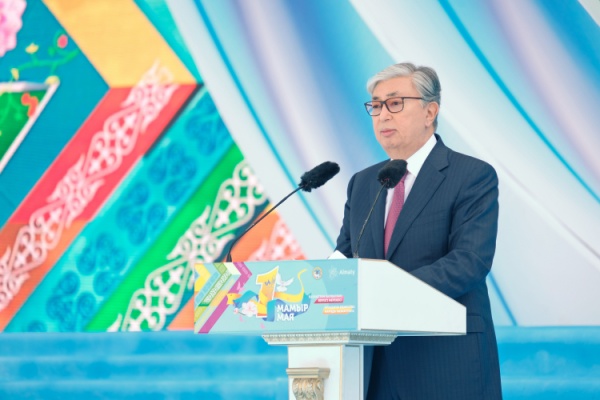President Tokayev Moves Ahead in Social Reforms
By Svante E. Cornell and Albert Barro
November 7, 2022
In his September 2022 address to the nation, President Kassym-Jomart Tokayev spent an inordinate amount of time on social issues, and in particular on reforms in the education and healthcare sector. This stems directly from the growing inequities in the provision of services in the country, where rural and remote areas in particular do not benefit from the same level of service provision as larger cities. The social reforms introduced by President Tokayev aim at correcting these problems, but their success will be dependent on the broader political reforms that intend to change the relationship between citizen and state in Kazakhstan.
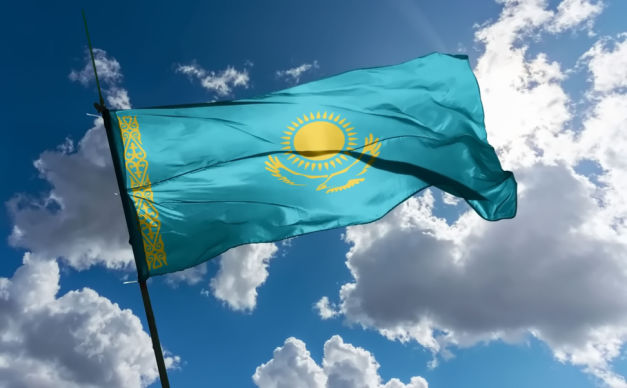
Learning from Kazakhstan's January Crisis
By Svante E. Cornell
April 18, 2022
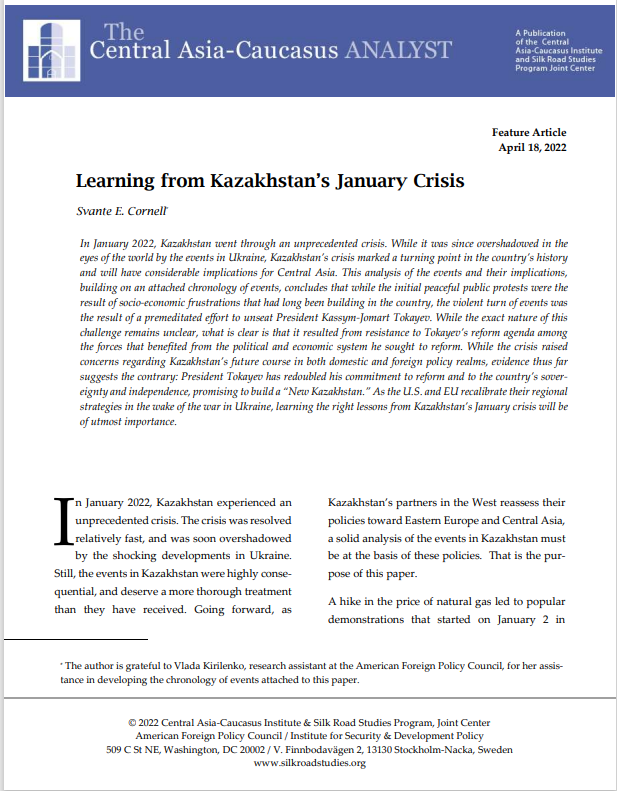 In January 2022, Kazakhstan went through an unprecedented crisis. While it was since overshadowed in the eyes of the world by the events in Ukraine, Kazakhstan’s crisis marked a turning point in the country’s history and will have considerable implications for Central Asia. This analysis of the events and their implications, building on an attached chronology of events, concludes that while the initial peaceful public protests were the result of socio-economic frustrations that had long been building in the country, the violent turn of events was the result of a premeditated effort to unseat President Kassym-Jomart Tokayev. While the exact nature of this challenge remains unclear, what is clear is that it resulted from resistance to Tokayev’s reform agenda among the forces that benefited from the political and economic system he sought to reform. While the crisis raised concerns regarding Kazakhstan’s future course in both domestic and foreign policy realms, evidence thus far suggests the contrary: President Tokayev has redoubled his commitment to reform and to the country’s sovereignty and independence, promising to build a “New Kazakhstan.” As the U.S. and EU recalibrate their regional strategies in the wake of the war in Ukraine, learning the right lessons from Kazakhstan’s January crisis will be of utmost importance.
In January 2022, Kazakhstan went through an unprecedented crisis. While it was since overshadowed in the eyes of the world by the events in Ukraine, Kazakhstan’s crisis marked a turning point in the country’s history and will have considerable implications for Central Asia. This analysis of the events and their implications, building on an attached chronology of events, concludes that while the initial peaceful public protests were the result of socio-economic frustrations that had long been building in the country, the violent turn of events was the result of a premeditated effort to unseat President Kassym-Jomart Tokayev. While the exact nature of this challenge remains unclear, what is clear is that it resulted from resistance to Tokayev’s reform agenda among the forces that benefited from the political and economic system he sought to reform. While the crisis raised concerns regarding Kazakhstan’s future course in both domestic and foreign policy realms, evidence thus far suggests the contrary: President Tokayev has redoubled his commitment to reform and to the country’s sovereignty and independence, promising to build a “New Kazakhstan.” As the U.S. and EU recalibrate their regional strategies in the wake of the war in Ukraine, learning the right lessons from Kazakhstan’s January crisis will be of utmost importance.
Kazakhstan: Evolving Challenges and Opportunties
By Richard Weitz
April 11, 2022
The resistance of Kazakhstan’s government to supporting the Kremlin’s war in Ukraine shows that, despite the brief Russian military intervention in Kazakhstan in January 2022, Kazakhstan still pursues a multi-vector foreign policy. Western governments can reinforce this stance, by which Kazakhstan strives to cooperate with all major powers while preventing the hegemony of any, through targeted support and other measures.
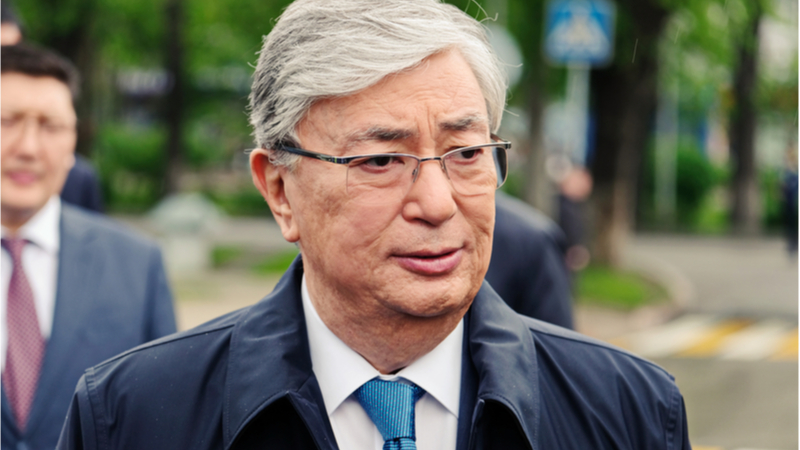
Elite fighting and the unrest in Kazakhstan
By Natalia Konarzewska
February 11, 2022, the CACI Analyst
On January 18, Kazakhstan’s former president Nursultan Nazarbayev gave a first video-recorded speech to the nation since the deadly unrest that shook the country in early January. In his address, Nazarbayev vehemently denied that there was any struggle for power in Kazakhstan’s top political echelons and called for supporting incumbent president Kassym-Jomart Tokayev. Yet there are many indicators that Nazarbayev, his family members and close associates are currently losing their posts in the state apparatus while president Tokayev concentrates his powers. The fast pace by which Nazarbayev’s legacy is dismantled by his successor in the aftermath of the recent deadly turmoil and CSTO intervention suggests that Kazakhstan’s carefully planned and micromanaged succession of power might have failed.
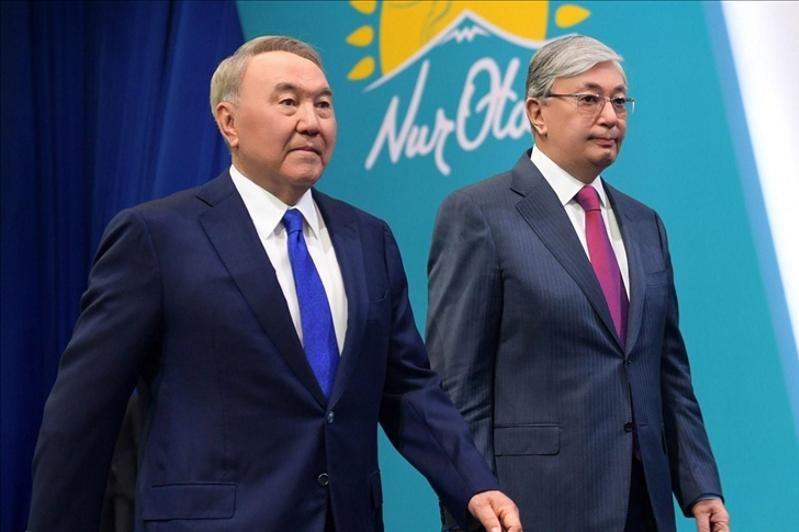
Tokayev’s Economic Reforms
By Albert Barro and Svante E. Cornell
Deceber 14, 2021, the CACI Analyst
While the political aspects of reforms in Kazakhstan have gained considerable attention, economic reforms are an equally strong focus of President Kassym-Jomart Tokayev’s policy agenda. Building on the initiatives developed by his predecessor, President Tokayev has implemented plans that serve to diversify Kazakhstan’s economy. Key measures include the development of agriculture, as well as the strengthening of manufacturing, in order to make Kazakhstan a bread-basket of Central Asia as well as a producer of household goods.
